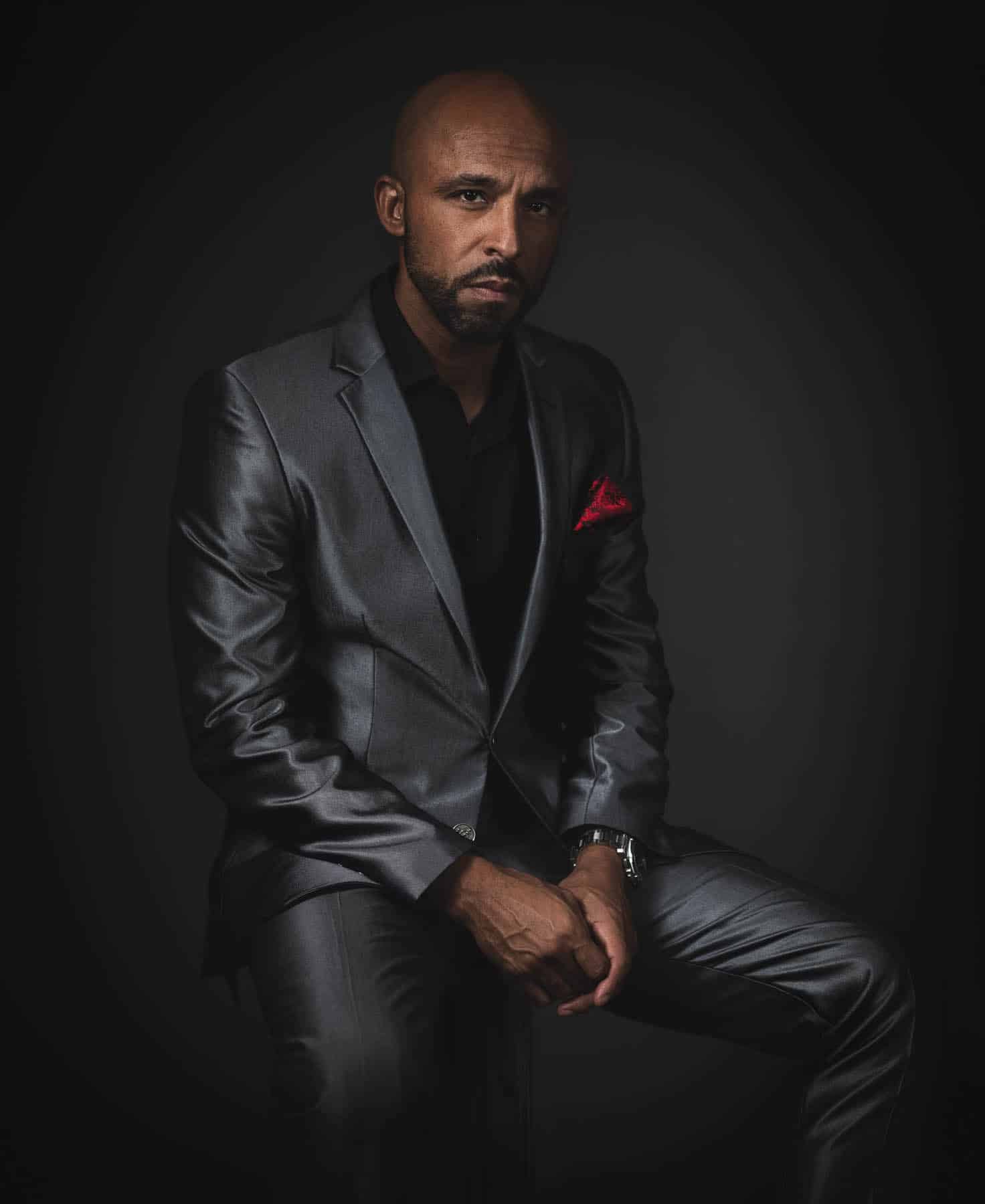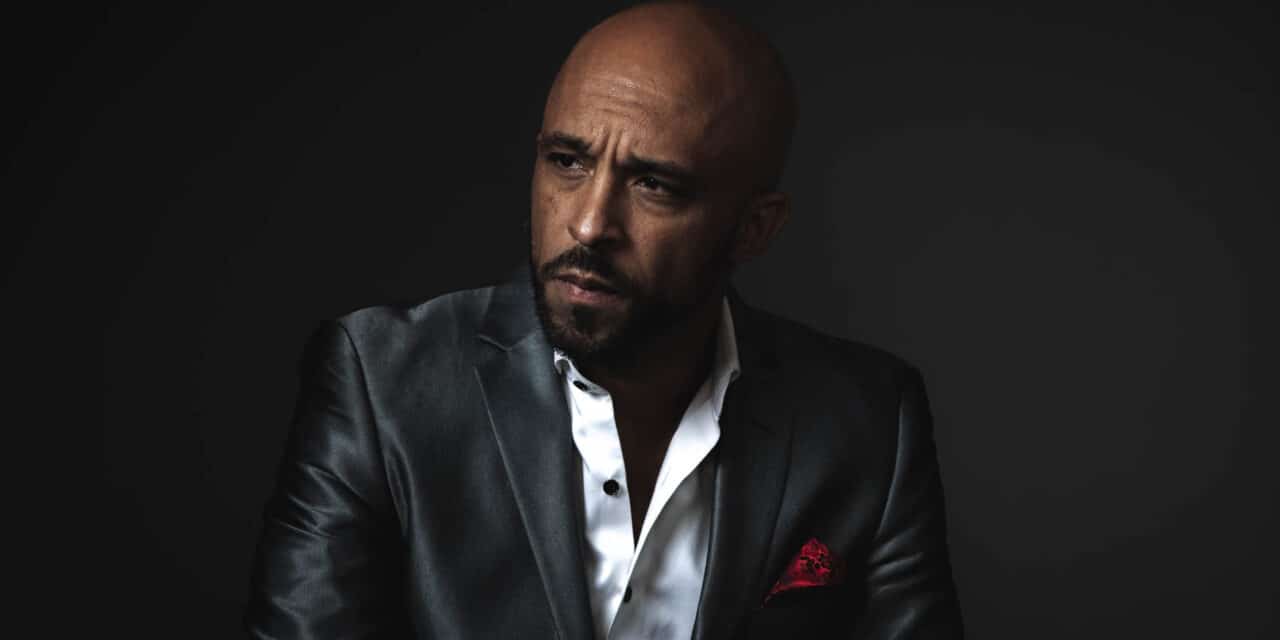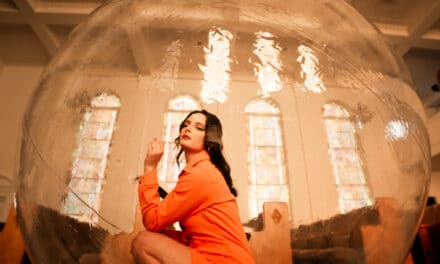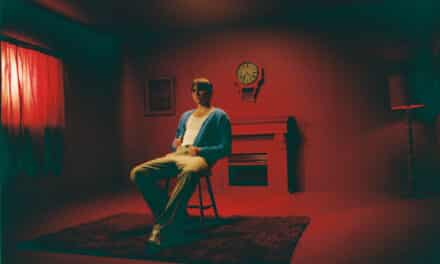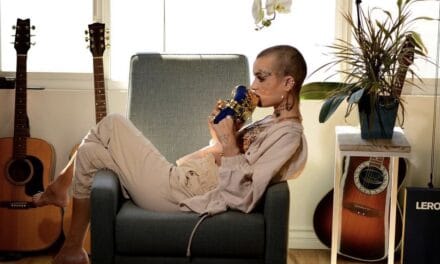Bianchi can soon be seen leading the sci-fi thriller series ‘RZR’ releasing on the new freemium platform, Gala Films, as the lead character – Grimm. The series, filled with major players such as Richard Cabral, Danny Trejo, Emilio Rivers, Christopher Marquette and Mena Suvari, takes us to a dystopian world of neural implants, artificial intelligence and the underbelly of black-market crime.
It debuted its trailer in Hall-H during San Diego Comic-Con last summer and began its 8-part roll out with 2 episodes launching on April 14th. It’s compliment project, Ghosts of Ruin, stars Rosario Dawson and is set to release later this year – priming GALA to become a true competitor amongst streaming services such as Netflix, Apple+ and others who have already earned multiple awards for series and films launched on their platforms.
Can you talk about your background and inspiration to work in film and television, writing, directing and acting?
I’ve always had a knack for performance and acting out. I used to get kicked out of class a lot for being a clown. It wasn’t until high school that I started considering film and television as a viable career path. I remember watching movies and thinking, “I can do that better.” Despite friends thinking I was crazy, there was an inner conviction that I could. I watched films avidly, and one that particularly resonated with me was “Posse,” starring Mario Van Peebles.
That movie was truly defining for me because it showed that brown people could lead in a charismatic and impactful way. I had never realized that black cowboys existed, having been raised in Clint Eastwood. “Posse” changed everything for me, lighting a fire and making me realize that success was achievable. I also credit Larry Clark’s film “Kids” for further shaping my perspective. Not only is it an incredible film, but it also showed that there’s a space in the world for dark, gritty, and controversial films about street life. Having spent many years in my teenage years in that world, I intimately understood it.
The grit of the human condition and the streets always drew me in. When I saw “Kids,” it wasn’t your typical polished Hollywood fare. It was a raw docu-narrative drama that made me feel like I was right there with them, exposing the rave scene, drug use, violence, racial slurs, and bullying – all sad but important aspects of American culture. It opened my eyes to the possibility of making films like that. These experiences have continued to influence me, which is why I gravitate towards dark themes in my work. In high school, I was heavily involved in theater, performing at various schools. Around the age of 17 or 18, I took a film class, which further fueled my passion.
I remember being tasked with shooting a scene on 16mm black and white film with a hand cranked Bolex camera. I gathered two friends and directed them in front of the fireplace at my parents’ home. It gave me a sense of pride in orchestrating human beings like set pieces, a different art form I hadn’t experienced before. When I rolled the camera, I heard it stutter oddly. It turned out I hadn’t balanced the sprockets properly, resulting in a disastrous double exposure. Despite most of the film being unusable, I was enamored with the individual compositions of each frame. Even though they were doubled up and superimposed, I found them fascinating.
I remember telling the professor who assigned me the scene that I was going to be a filmmaker for the rest of my life. He looked at me and cautioned me to have a fallback plan, especially after seeing the disaster I had made. Despite his warning, I went on to study theater at Arizona State University, graduating Magna Cum Laude. I honed my acting skills on the main stage and co-wrote my first play there. Starting a film club (as there was no Film minor at the time), I directed my first short film in 2003. Despite not knowing what I was doing, it felt right, giving me purpose in bringing teams together to create something. That was the beginning of what has propelled me to where I am now, 21 years later.
In 2021 you did a deep dive into NFT’s, blockchain and Web3 and how they could help the film industry.What did you learn that creatives in the arts can benefit from with their own creative projects and endeavors?
For me, 2020 and 2021 were exactly that. I had been honing my skills as an independent producer for 17 years, focusing on experimental short films told in poetry, which I call Spinema (™) (spoken word cinema). Then, in March 2021, during the pandemic when survival was a concern for many, I found myself exploring new directions. Having been involved in cryptocurrency since 2017, understanding blockchain made it easy for me to grasp NFTs (non-fungible tokens). I first heard about NFTs due to a $69 million sale at Christie’s for an artist named Beeple Crap, which piqued my interest. Immersing myself in this world, I knew I wanted to enter as an artist, but I needed something unique to me.
I minted the first-ever spoken word film as an NFT titled “I Can’t Breathe,” a soliloquy to the murder of George Floyd in the summer of 2020. This project successfully auctioned to the same team that acquired Beeple’s $69 million piece.
We donated the proceeds to the George Floyd Memorial Foundation, sparking a rise in the high art scene through crypto art and fostering numerous influential relationships. Through blockchain technology and smart contracts, I discovered the potential for revolutionizing not only secondary royalties for artists but artistic payment systems in general. Historically, artists never received secondary royalties for their work, even going back to caveman paintings. Web 3 technology makes art globally accessible while also providing ownership and enabling automated residual payments and financial waterfalls.
For the first time in internet history, we can now own digital assets on the blockchain, making them immutable and unique, hence the term non-fungible token (NFT). When I discovered the power of this technology, I knew I was here to stay.
I was applauded as David Bianchi, the artist, heralded my work in a way I’d never experienced before. My art was admired, and discussed with a depth that confirmed for me that what I can achieve in Web Three can never be replicated in Hollywood. However, I believe we can merge this technology, creative freedom, and creator economies with Hollywood to create something new. At Gala Film, we’re not reinventing the wheel; we’re working to make it better.
What is the specific premise and inspiration for your new sci-fi series RZR? What does the name signify?
RZR draws inspiration from Elon Musk’s Neuralink technology. While Musk isn’t the pioneer of Brain-Computer Interface (BCI), his prominence in the field sparked my interest. The story revolves around a man installing an implant in their brain, granting instant access to all data: downloading, transmitting, and triggering actions in nanoseconds. Imagine having the entire power of the Internet at your fingertips, instantly accessible in your mind.
RZR delves into questions of human will and morality when granted ultimate power. It challenges whether morality still holds significance when one possesses an absolute edge over others. Additionally, the aesthetic elements of RZR including its grit, look, texture, camera work, and costumes are influenced by my life experiences.
As a former rave promoter for nine years, electronic music and culture, like black clothes and B-boy culture, are deeply ingrained into who I am. Raving in warehouses for days straight was part of my past, and I wanted to infuse that gritty, industrial energy into the series. I aimed to create a series I would personally enjoy watching, with grounded performances that explore both the strengths and flaws of humanity. The series centers around a flawed individual, a closeted genius and addict, striving to make the world a better place despite his personal struggles.
Films like “Children of Men,” “Requiem for a Dream,” “Kids,” and even “Spring Breakers” with its intriguing sequences served as inspirations. These are the kind of films that cinematographers and directors truly admire. The goal was to create a cinematic series that could be compartmentalized as a television episodic show but prioritizes every language of cinema – from visuals to sound.
Can you talk about transcending the roles of actor, writer, director; wearing those hats and changing mindset to fit the role?
I’m an artist first, whether writing, acting, producing, or directing – are simply vessels to execute my creativity. Whether I’m performing a poem, painting a canvas, or crafting a screenplay, they’re all expressions of my art. Ultimately, I hope to leave behind a body of work that people can discuss, admire, and find inspiration in.
Regarding preference, each role offers unique modalities. Producing, while not the most creatively fulfilling, involves logistical, administrative, and intense project management skills. Acting and directing, on the other hand, are fluid and transformative, evoking thought and emotion. Directing, akin to painting with light, allows for storytelling through images and technical nuances.
Becoming a producer was necessary to create opportunities for myself to act. As I honed my skills in production, I ventured into directing and writing, facing different challenges along the way. Writing, in particular, is a solitary and introspective process, but it serves as a necessary avenue for my creativity. Ultimately, all these roles—producing, writing, directing—have led me to the same destination: high-level creativity, where I am today.
How would you describe your concept of ‘Spinema’ and how can it be applied?
Spinning cinema through spoken word or Spinema (™) is an art form I’ve developed over nearly two decades, blending all facets of my creative identity—director, producer, writer, performer, and poet. In this unique medium, poetry serves as the script, but conveying the emotions requires interpretation through physical performance. It’s a skill set that not every poet possesses, but it’s integral to creating compelling Spinema(™) films.
I’ve found that great actors can excel as poets on screen. This is because actors are trained to be malleable, like Bruce Lee said, to be fluid and conductors of emotions. In a Spinema(™) film, performers must take the poetry and transform it into performance art. While many talk about spoken words, I believe every word is spoken, so what sets individuals apart in this realm?
I like to call it performance poetry because it blurs the lines between poetry and performance. A good poet, whether on stage or in a Spinema(™) film, can convey catharsis even on mute. Their emotive range spans pain, anguish, elation, satisfaction, grief, and happiness. Whether reciting poetry akin to Shakespearean verse or delivering prose in a film, emotions are always conveyed through a lens. It takes a unique performer to deliver poetry viscerally while navigating the nuances of the camera.
For the most part, these films are socially conscious, raising awareness because poetry often stems from underlying conditions. Whether it’s heartbreak, injustice, or the beauty of a sunrise, poetry serves as the graffiti on the wall and the daily journal of life. Society inspires poetry in myriad ways, hence its tendency to be socially conscious.
Can you talk about your work on ‘Westworld’?
Westworld was a dream come true for me during a challenging phase of my life. I auditioned three times and did not receive a callback, one day the phone rang, and they offered me a role—though they didn’t specify which one. Arriving on set, I spent many days there due to scheduling delays before learning that I would be doing scene work with Jeffrey Wright and Anthony Hopkins. It was a surreal moment and a dream come true to work alongside such esteemed actors. Despite feeling stunned, Anthony Hopkins, (or Tony as he preferred to be called), was incredibly kind and generous. Working with him allowed me to overcome many fears as an artist. Being thrown into scenes with an Oscar and Golden Globe winner, now Oscar nominee, was truly a bucket list moment for me.
That experience undoubtedly stands as one of the greatest moments in my professional acting career. The lesson I took away from it is that as actors, our job is to “book the room.” Our responsibility is to take the text and interpret it into a performance that resonates with those in the room. However, our job is not to book the job itself because that aspect is entirely out of our control. We must focus our energy on what we can control—our delivery of the performance.
What would you like to do that you haven’t – Dream projects/talent to work with etc?
In terms of Hollywood legends, there are usual suspects whom I would love to work and collaborate with, including Tom Hardy, Darren Aronofsky, Denzel Washington, Morgan Freeman, Adrien Brody, Giancarlo Esposito, Denis Villeneuve, Alejandro González Iñárritu, Leonardo DiCaprio, Bradley Cooper, and Brad Pitt, among others. However, I firmly believe in focusing on the work, while leaving the results to God.
When I first developed RZR I couldn’t have imagined the talented cast, we ultimately assembled. Mena’s love for the script led her to become our antagonist, fulfilling a dream for me. As long as I continue to prioritize personal growth, hard work, dignity, quality, and conviction in my craft, I believe I’ll attract incredible talent. Delivering performances rooted in honesty and justice is what matters most to me. Ultimately, it’s about being proud of the work we create, as it reflects the individuals we’ve become. I trust that the right opportunities and collaborations will come my way.
What are you planning for the future to follow RZR?
The journey of RZR is just beginning, with plans for Season 2 already in motion. My writing partner and I have developed the treatment for Season 2 and crafted a graphic novel for the initial episodes. However, my vision for RZR extends beyond a mere episodic series—I envision it evolving into a large-budget feature film and potentially even an RPG game. I believe there are no limits to its potential.
What would you tell creatives coming up that you wished you’d known early on?
Wow. Work hard at failing. Create regardless. The only obstacles in your path. Are mostly created by you. Stay out of your own way. Understand that ‘no’ is the best word that you can hear. Because it forces you to move in a different direction. Nothing is personal. Everybody’s perceptions of you have nothing to do with how you identify. Work ferociously. But do it. With tact. Care about your brand. Find your voice. And find a tribe of people that will circle around you, that are at your level, that are ready and willing to create with you. At the level that you are at. Have conviction. Make a decision, even if it’s the wrong decision. But make a decision. And never wait. The clock is always ticking. There is always something to do. And have fun along the way. Don’t worry about the end result. Worry about. Today’s results.
Do you have charities you support?
I do monthly contributions to the Midnight Mission. In Los Angeles, the homeless population in LA has gotten out of control and many of them suffer from drug addiction, and so I’m very sensitive to that. Historically, I have always been involved in philanthropy and the films that I create. I am an artist with my Spinema (™) films. I’m very interested in providing for people.
